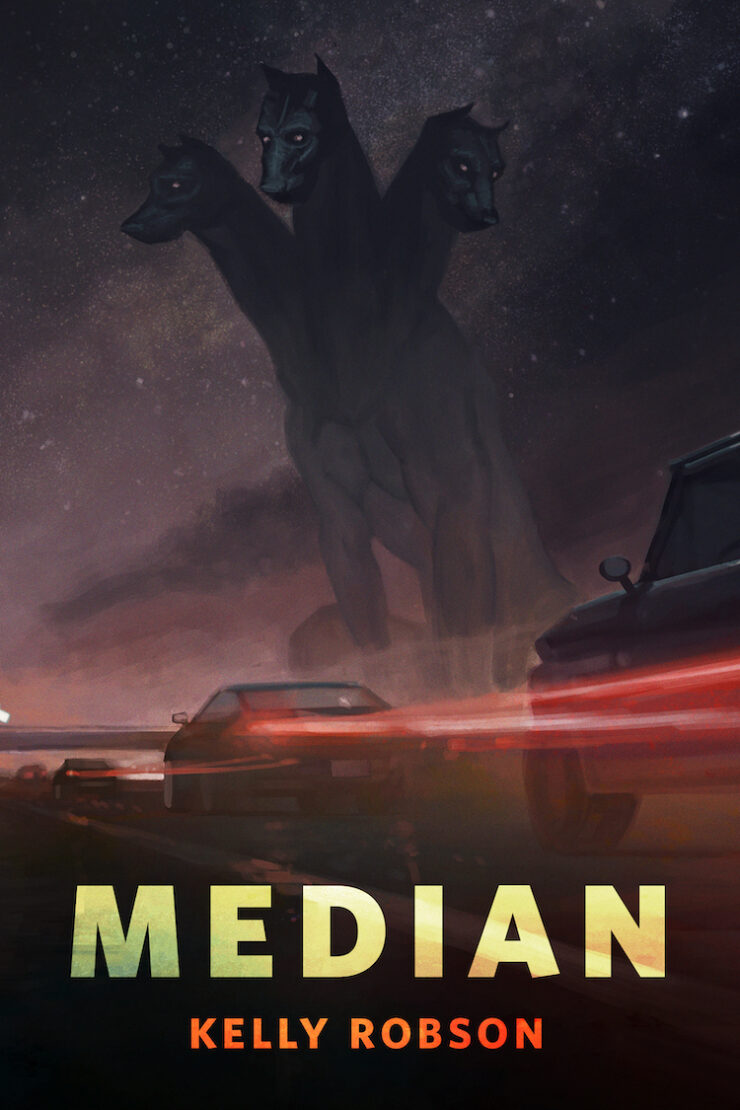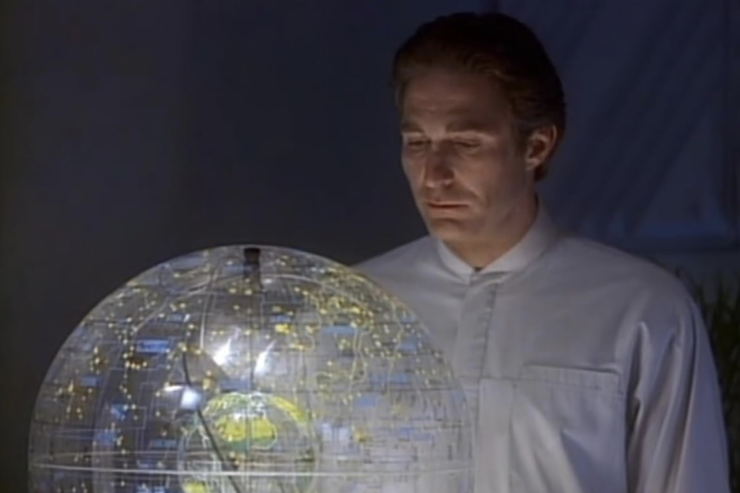“The Gathering”
Written by J. Michael Straczynski
Directed by Richard Compton
Season 1, Episode 0
Production episode 0
Original air date: February 22, 1993
It was the dawn of the third age… We open with Ambassador Londo Mollari’s voiceover setting the stage: the dawn of the third age of mankind, whatever that means, and how the last of the Babylon stations, Babylon 5, was the last best hope for peace. A station in neutral space constructed by the Earth Alliance and administered by their military, EarthForce, it is home to dozens of species, with the five major powers in this area of the galaxy represented: Earth Alliance, the Minbari Federation, the Centauri Republic, the Narn Regime, and the Vorlons. Tensions are high, as the Earth-Minbari War wasn’t that long ago, and the Narn used to be a subject species of the Centauri, but now are the ascendant power while the Centauri are a shadow of their former selves.
Lt. Commander Laurel Takashima, the first officer, is in Command & Control, overseeing a ship docking at the station. The security chief, Michael Garibaldi, calls C&C saying that the station commander is needed to greet a new arrival. Takashima says that he’s already on his way.
Sure enough, Commander Jeffrey Sinclair greets Lyta Alexander, a telepath from Psi Corps who will be working on the station, available to be hired. Sinclair tells her a bit about the station, taking her through the alien sector, where those species who require something other than Earth-normal atmosphere and/or gravity hang out.
Another person who arrived on the transport is a human named Del Varner. In fact, we saw him initially during Mollari’s voiceover, so we know he’ll be important….
Four of the five representatives are on the station: Delenn representing Minbar, Mollari representing the Centauri, G’Kar representing the Narn, and Sinclair reprsenting Earth. The fifth is en route: Kosh from the mysterious Vorlons, about whom very little is known. At one point, Sinclair joins Delenn in the Chinese garden, and she, to his surprise, provides all the intelligence the Minbari have on the Vorlons. It’s not much, but it’s more than Earth has…
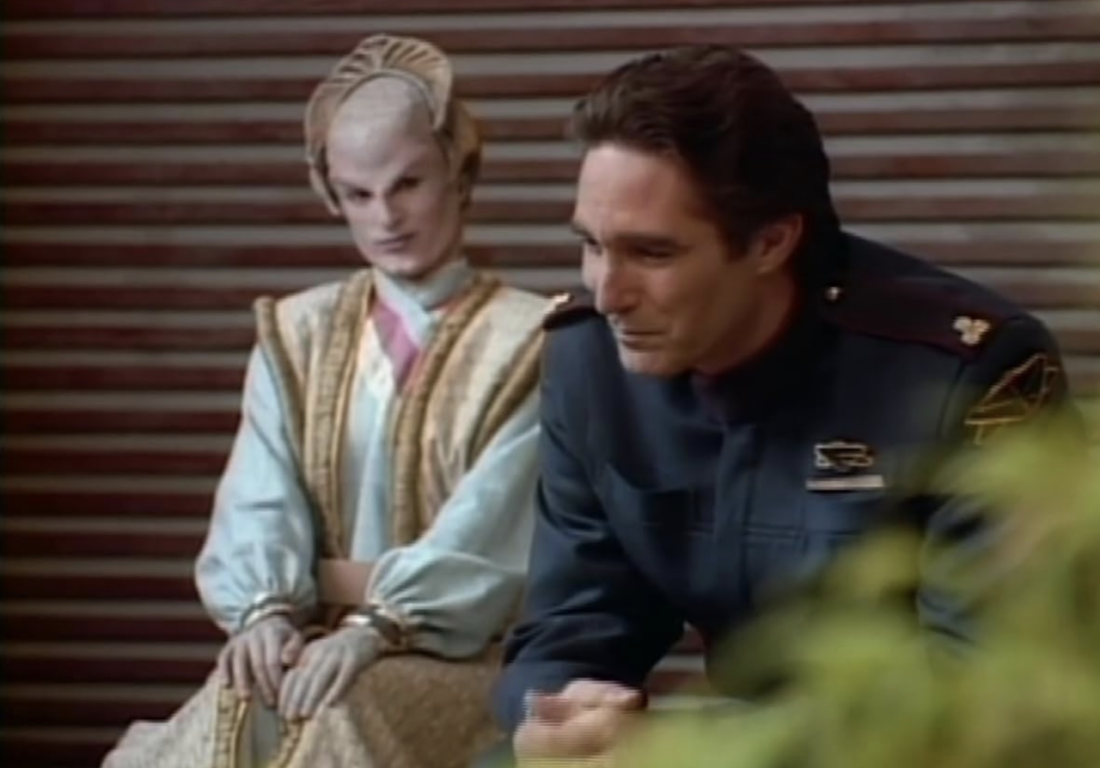
G’Kar complains to Takashima about a Narn supply ship that is being denied docking. Takashima explains that the shipmaster has refused to consent to a weapons scan, and they can’t let the ship dock without that. G’Kar leaves in a huff. In fact, he leaves in a minute-and-a-huff.
Kosh’s ship arrives two days early. Also en route is the ship belonging to Sinclair’s girlfriend, a trader named Carolyn Sykes. Garibaldi asks G’Kar and Delenn to be at the docking bay to meet Kosh, but he’s having trouble tracking down Mollari—eventually finding him in the casino, losing a lot. Mollari asks Garibaldi for a loan (obviously not the first time he’s made that request), which Garibaldi refuses (obviously not the first time he’s said no). However, Varner offers to stake him.
G’Kar changes his mind, and tells Takashima to go ahead and do the weapons scan on the supply ship.
En route to meet Kosh, Sinclair’s elevator stalls out. By the time he makes it to the docking bay and meets Garibaldi, they find Kosh unconscious on the deck. Vorlons have to wear full-body encounter suits in order to interact with other species for reasons that nobody’s too clear on (which is par for the course with the Vorlons). Takashima reports that the Vorlons have stated in no uncertain terms that Kosh’s encounter suit is not to be removed. Dr. Benjamin Kyle is not happy, as he can’t treat his patient without removing the suit.
Sinclair instructs Kyle to open the suit, but to do it alone, with all monitors turned off. Kyle is bound by doctor-patient confidentiality not to reveal what he sees. Kyle’s subsequent examination reveals that Kosh was poisoned. But Kyle can’t determine where the poison was applied, nor what the poison is.
Sinclair locks down the station, and Garibaldi conducts an investigation. One of his prime suspects is Mollari, who wasn’t at the reception with Delenn and G’Kar.
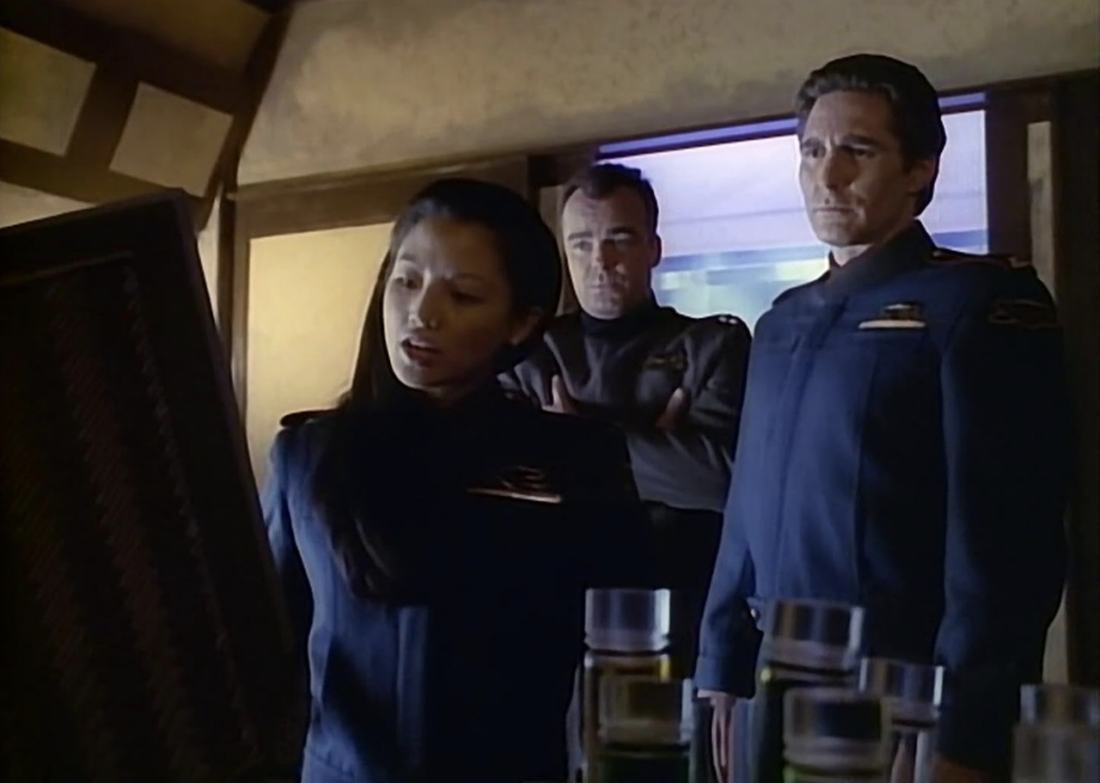
G’Kar approaches Alexander after she finishes a job. The Narn have no telepaths, and they wish to produce some. G’Kar makes her an offer to help them do so, either by G’Kar and Alexander mating, or by cloning, which would be a much more complicated process. G’Kar will pay her more if they just mate.
Sinclair finally gets to have some mad, passionate nookie-nookie with Sykes. He also tells Sykes a bit of his personal history that he’d been avoiding telling her before: that he was part of the Battle of the Line, the final battle in the Earth-Minbari War, of which he was one of the few survivors. He was doing a kamikaze run at one Minbari ship, then he blacked out, and the next thing he knew, it was twenty-four hours later and the Minbari had inexplicably surrendered, ending the war.
Takashima and Kyle convince Alexander to perform a mind-scan on Kosh. She reluctantly does so, only to discover that Sinclair is the one who poisoned the ambassador by putting a skin tag on Kosh’s hand.
Garibaldi’s investigation leads to Varner, but checking his quarters reveals Varner’s dead body. Confusing the issue is that he’s been dead for days, even though he’s been sighted more recently.
Sinclair is temporarily removed from B5’s council, replaced by Takashima. After the council questions several witnesses, including Kyle, G’Kar moves that they turn Sinclair over to the Vorlons. Takashima votes no, Delenn abstains, while Mollari and G’Kar vote yes. But that tie is broken by the proxy vote the Vorlons provided to G’Kar, making it a majority yes vote.
The Vorlons will arrive in twelve hours. Mollari apologetically explains to Garibaldi that G’Kar blackmailed him into the yes vote. He had information about one of Mollari’s ancestors that would prove politically embarrassing to him.
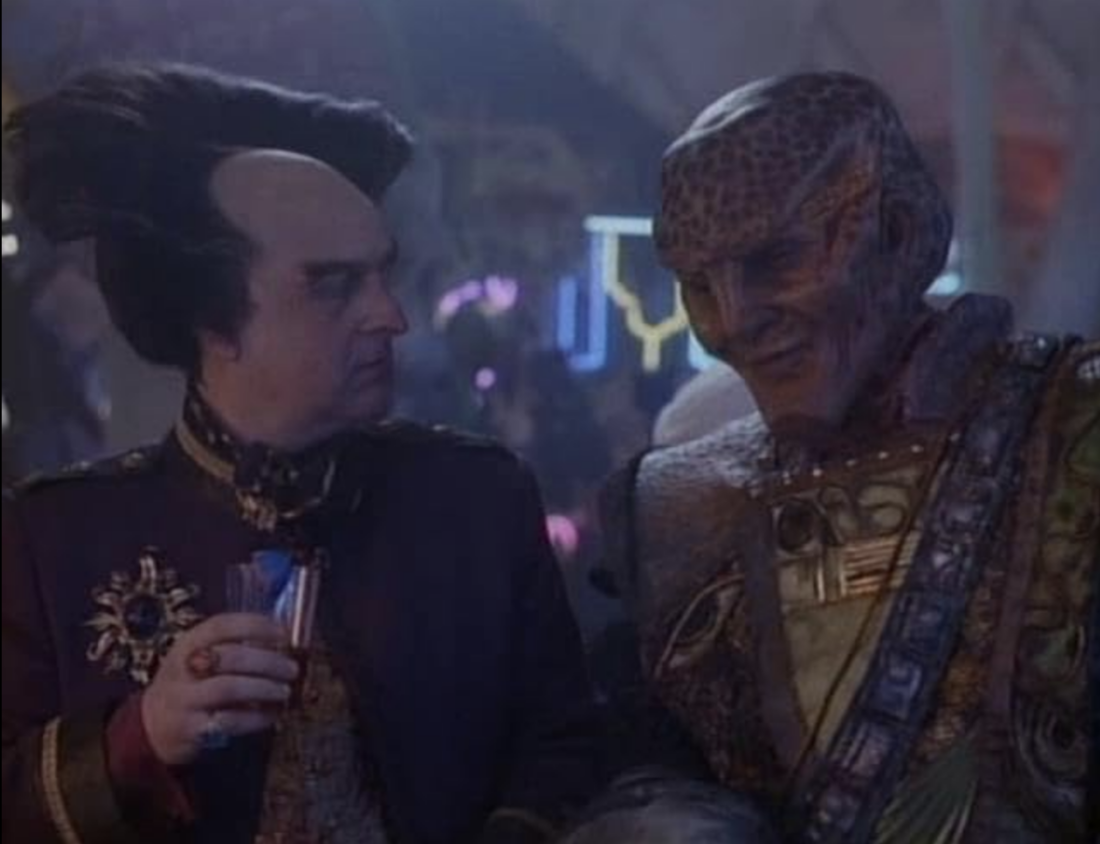
G’Kar approaches Delenn about the possibility of a Minbari-Narn alliance. But when he mentions a rumored shadowy organization in the Minbari Federation called the Grey Council, Delenn immediately attacks G’Kar, nearly killing him, and making it clear that she’ll do worse if he ever even mentions the Grey Council again.
Another body is found, that of a technician who has been seen since his time of death. Kyle is working in the medical bay, having found an antidote to the poison, when he sees Alexander enter, and she starts sabotaging the medical equipment—and tossing Kyle across the medical bay when he tries to stop her. But then the real Alexander walks in, and the duplicate runs away.
It’s now clear what’s going on: Garibaldi has learned that Varner was a smuggler dealing in black-market tech. His most recent trip had him acquiring a changeling net, which would enable its wearer to look like anyone. The net would give off a lot of energy, so Sinclair has Takashima do a scan of major energy sources, and then blank out anything they know about—life support, lights, and so on—and the only one that isn’t accounted for is small and moving through a remote part of the station. Sinclair and Garibaldi suit up and go after it. At Takashima’s suggestion, they take a recorder that will document everything, so they have proof for the Vorlons.
Garibaldi is injured, but Sinclair manages to stop the assassin, after he has cycled through several different disguises (including Sinclair himself). Eventually, he’s revealed to be a Minbari, a member of their Warrior Caste. Before blowing himself up, he says that Sinclair has a hole in his mind. Later, Sinclair queries Delenn about that, but Delenn blows it off as a standard Minbari insult. The nervous look Delenn gets before saying that makes it obvious to the viewer (but, for some reason, not to Sinclair) that she’s lying.
Sinclair shares a drink with G’Kar, revealing that he knows that the changeling net was brought on the delayed Narn supply ship, which was why Varner had to come to the station to pick it up, and then provide it to the assassin. G’Kar says Sinclair has no proof; Sinclair counters that he put a nanotech tracker in the drink they just shared, so now Sinclair will always be able to follow G’Kar. Outraged, G’Kar once again leaves in a huff. Sinclair then reveals to Garibaldi that he was lying, but that’ll it’ll be fun watching G’Kar try to find the tracker that isn’t there in his intestinal tract.
The big hole made by the assassin is being fixed, Ambassador Kosh is up and about, Sinclair has been cleared, and the station is, as Takashima says, open for business.
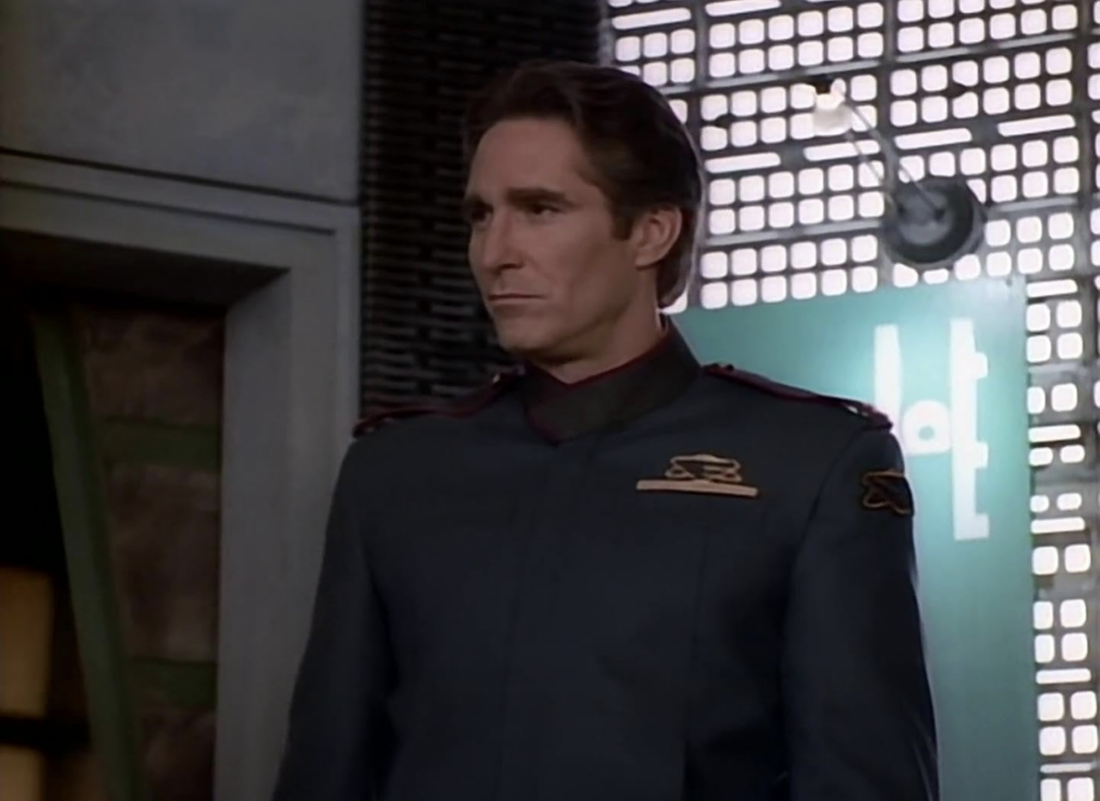
Nothing’s the same anymore. Sinclair gets to hit several rough-and-tumble leader clichés, including the close friend whom he hires even though nobody else wants him, being accused of a crime he didn’t commit, and insisting on stopping the bad guy himself despite having an entire frickin staff under his command.
The household god of frustration. Garibaldi is established as difficult, having bounced from assignment to assignment. He also doesn’t exactly light the world on fire with his investigation, as most of the work is done by Kyle and by the assassin being seen disguised as Alexander when Alexander walked into the room.
If you value your lives, be somewhere else. Delenn is surprisingly friendly to Sinclair, which he doesn’t expect, given the history between Earth and Minbar.
In the glorious days of the Centauri Republic… Mollari is pretty broken, reduced to gambling and drinking and lamenting the days when the Centauri Republic was a super-power instead of a has-been power.
Though it take a thousand years, we will be free. G’Kar is a manipulative bad guy in this one, showing an impressive ruthlessness and a tiresome nastiness.
The Corps is mother, the Corps is father. We learn that humans have developed telepathy, and there’s a Psi-Corps that supervises and adminstrates telepathic activity. The rules regarding telepaths are very strict, including no unauthorized mind-scans.
The Shadowy Vorlons. Vorlons wear encounter suits at all times and “for security reasons” don’t allow them to be removed. Very little is known about them by anyone else on the station.
Looking ahead. The hole in Sinclair’s mind will become extremely important down the line.
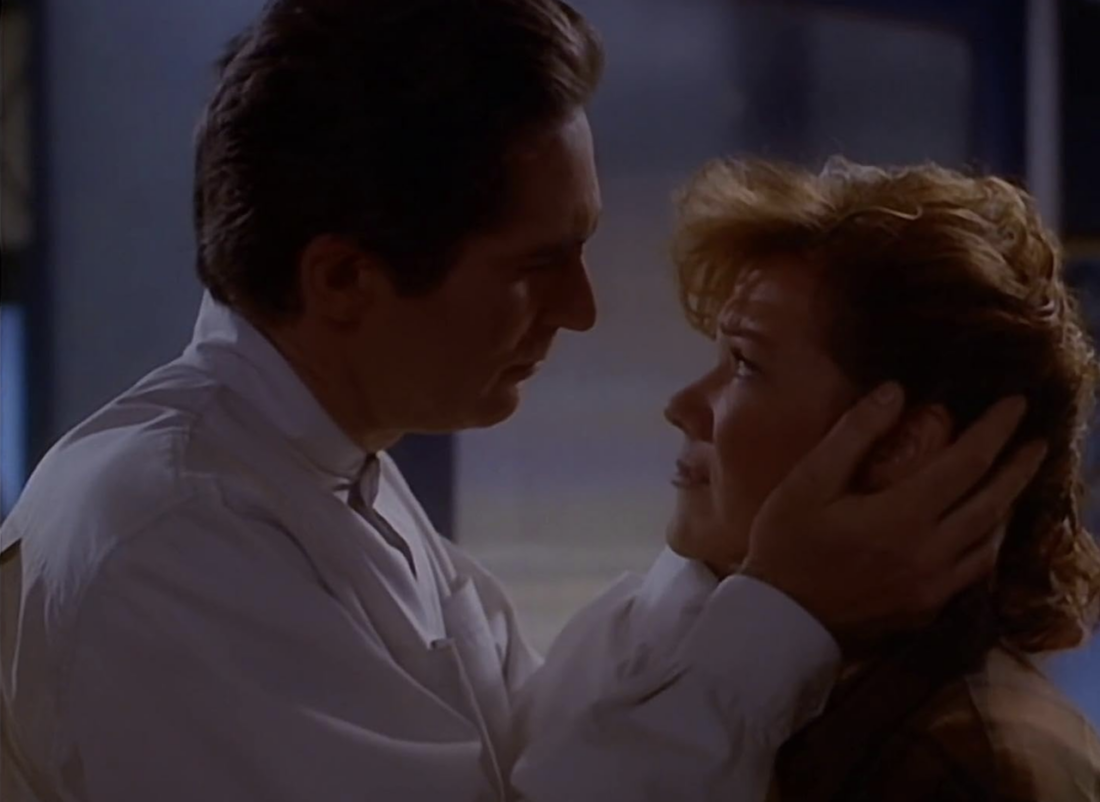
No sex, please, we’re EarthForce. Sinclair and Sykes are in a nice relationship; at one point Sykes tries to convince him to resign his commission and go off adventuring with her. He says he’ll think about it.
Also G’Kar tries to mate with Alexander in a scene that is eye-rolling and creepy all at the same time.
Welcome aboard. In this pilot movie, the only stars are Michael O’Hare (Sinclair), Tamlyn Tomita (Takashima), Jerry Doyle (Garibaldi), and Mira Furlan (Delenn). Peter Jurasik and Andreas Katsulas are listed as guest stars, as are Blaire Baron (Sykes), Johnny Sekka (Kyle), and Patricia Tallman (Alexander), even though all were intended to be regular characters. In addition, John Fleck plays Varner and Paul Hampton plays the senator.
Hampton will return next time in “Midnight on the Firing Line.” Tallman will return in “Divided Loyalties” in season two.
Also Ed Wasser plays one of the C&C officers; he’ll return in the recurring role of Mr. Morden starting in “Signs and Portents” later in the first season.
Trivial matters. Two different versions of this exist in the world: the original as aired in 1993 and a re-edit that was released when the show moved to TNT in 1998. Some of those changes were to fix things that later became continuity errors, including G’Kar’s reference to his wife and Mollari’s referring to Sinclair as the last commander of the station in his opening voiceover. Others were simply tightening some scenes and including some scenes that were cut, including a confrontation Sinclair has with a smuggler and Sykes meeting with Delenn. Sinclair and Alexander’s trip through the alien sector was cut down, as there were (legitimate) complaints that it looked too much like a zoo. The music by Stewart Copeland was redone by Christopher Franke, who was the composer for the series. In the original, Tamlyn Tomita’s dialogue was redone and looped in when Warner Bros. complained that she sounded too harsh; the new version restores Tomita’s original performance. Finally, the biggest change was Kosh referring to the assassin disguised as Sinclair as “Entil’Zha Valen,” a reference that will pay off in the “War Without End” two-parter in season three.
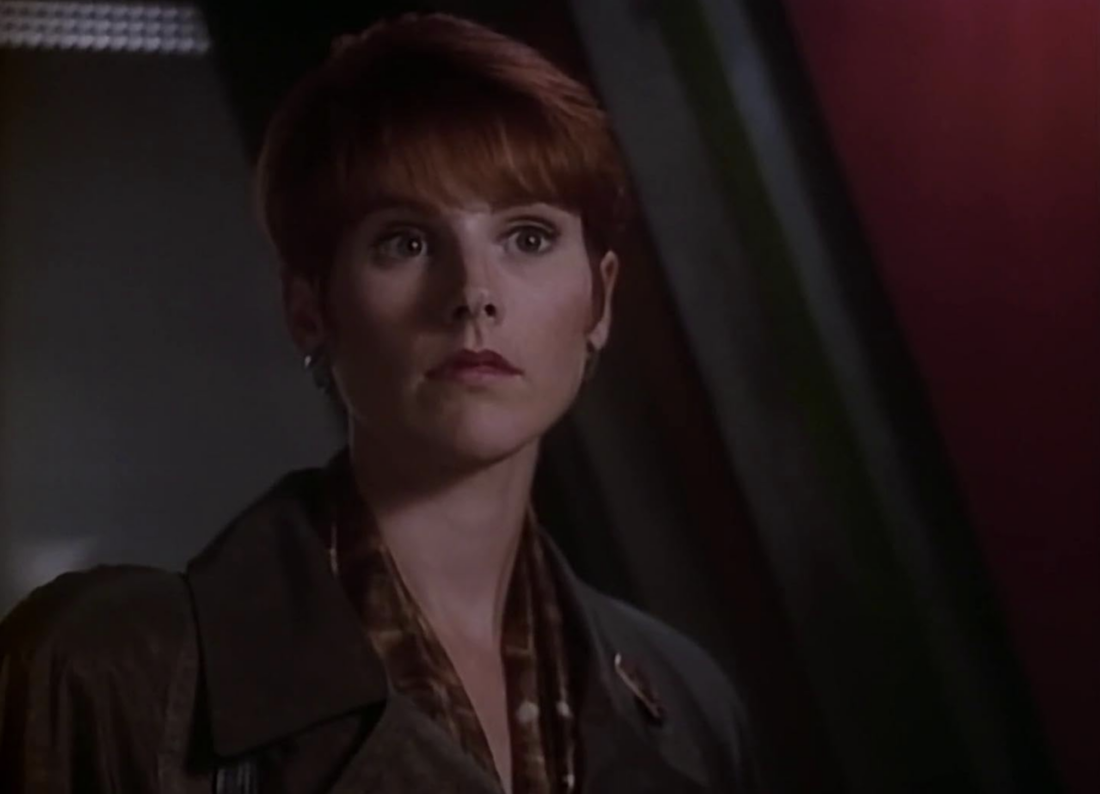
Tomita, Blaire Baron, Johnny Sekka, and Patricia Tallman were all intended to be regulars, but they did not continue on the series for various reasons. Tomita was replaced by Claudia Christian’s Susan Ivanova, Baron by Julia Nickson-Soul’s Catherine Sakai, Sekka by Richard Biggs’ Dr. Franklin, and Tallman by Andrea Thompson’s Talia Winters. Tallman’s Alexander would, however, return to the show as a guest in seasons two and three and become a regular for seasons four and five. Plotlines originally intended for Takashima were transferred either to Ivanova or to Winters.
Delenn was originally intended to start out as a man, but would emerge from the chrysalis at the top of season two as a woman. But they couldn’t make Mira Furlan masculine enough, apparently, so they abandoned it and just had her be female all along.
Furlan’s and Andreas Katsulas’ makeup were both changed when the show went to series, as were the EarthForce uniforms.
“The Gathering” was nominated for a Hugo Award for Best Dramatic Presentation. The award went to Jurassic Park.
The echoes of all of our conversations.
“There was a time when this whole quadrant belonged to us! What are we now? Twelve worlds and a thousand monuments to past glories—living off memories and stories, and selling trinkets. My God, man—we’ve become a tourist attraction. ‘See the great Centauri Republic, open 9 to 5, Earth time.’”
—Mollari, lamenting to Garibaldi

The name of the place is Babylon 5. “Babylon 5 is open for business.” There are three things a pilot needs to introduce: the characters, the types of stories that will be told, and the setting. The latter is more challenging in the science fiction/fantasy genre because it’s the only genre in which the setting isn’t real. So in addition to everything else, you’ve got to build a world and make it convincing.
Whatever the flaws of “The Gathering”—and they are legion—it did that part of it beautifully. Creator/writer/co-executive producer J. Michael Straczynski gives us a fully realized future history. We get an Earth that’s a power, but not the biggest power. We get the ugly history between the Centauri and the Narn, with the latter having burst onto the scene after being subjugated by the former, while the Centauri themselves are much less than once they were. And there’s the history of the Earth-Minbari War, which left scars on both sides—as well as the complete confusion as to why the Minbari surrendered.
Surrounding this world-building is a story that’s a pretty straightforward whodunnit with tech and a script that can generously be called awkward. The moment where Alexander asked Sinclair why the station was called Babylon 5, I groaned. Thirty-one years later, that conversation remains the tin standard for awkward exposition, not aided by the fact that I kept thinking of the Swamp Castle litany in Monty Python and the Holy Grail. (To this day, I always refer to Babylon 4 as having fallen into the swamp.)
That clunkiness of dialogue runs throughout, alas, not aided by performances that range from mediocre to uneven. Jerry Doyle’s Garibaldi is a walking, talking cliché of the maverick cop, Andreas Katsulas’ G’Kar is a mustache-twirling villain of the most ludicrous type (the scene where he proposes mating with Alexander is embarrassing), and Patricia Tallman’s Alexander ranges from stilted (her accusation of Sinclair comes across as a teenager throwing a tantrum) to excellent (her body language when she’s the disguised assassin is completely different, making it clear from jump that this isn’t really Alexander). All three characters will, of course, get better, but that just makes watching the early versions of them even more painful to watch. G’Kar especially—Katsulas was one of the finest actors of his time, always able to bring menace and nuance to his roles (which were almost always villainous to some degree or other), and G’Kar would certainly become a complex and tragic character as the show went on. But the G’Kar of “The Gathering” has muted menace and absolutely no nuance, and feels like an utter waste of Katsulas’ talent.
The leader of an ensemble needs to have a certain charisma in order for the ensemble to work, and sadly Michael O’Hare doesn’t quite have it. O’Hare is the type of actor who’s better off playing the sidekick or the helpmeet or the bad guy. (He played Colonel Jessup in the theatrical version of A Few Good Men on Broadway, and he was amazing. It was a hundred and eighty degrees from Jack Nicholson’s performance of the same role in the movie version, instead bringing a quiet, solid intensity.) He would’ve been perfect to play Garibaldi, truly.
Besides the world-building, the other way in which the pilot absolutely shines is in the character of Londo Mollari, brilliantly played by the great Peter Jurasik. In 1993, he was best known for his role of the squirrelly and slimy Sid the Snitch on Hill Street Blues and its short-lived spinoff Beverly Hills Buntz, which in no way prepared anyone for this. He magnificently brings the broken-down Centauri ambassador to life. The bit I quoted in “The echoes of all our conversations” above is a masterpiece, showing us how far the Centauri Republic in general and Mollari in particular have fallen.
Finally, there’s the CGI visual effects, which were groundbreaking at the time, and which I was dreading on this rewatch, as I feared they wouldn’t have aged well. And, well, they haven’t, but it wasn’t as bad as I was expecting. Mostly the biggest problem with the VFX is the same problem CGI continued to have up until 2010 or so: too bright and shiny and completely unable to convey mass. But it’s not fatal, and the CGI is well integrated.
Next week: “Midnight on the Firing Line.”





